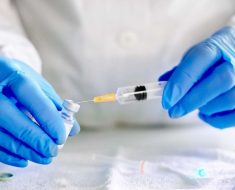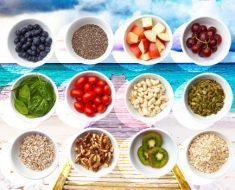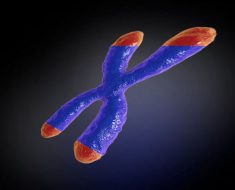This Morning's Dr Chris discusses collagen supplements
We use your sign-up to provide content in ways you’ve consented to and to improve our understanding of you. This may include adverts from us and 3rd parties based on our understanding. You can unsubscribe at any time. More info
Supplements add nutrients to the body where your diet is insufficient. Eating a healthy diet, which includes supplements, is a surefire way to help slow down the ageing process alongside adequate skincare, hydration, exercise and other factors such as genetics. Not sure which supplements to take? Express.co.uk reveals the best four vitamins and mineral supplements to take for ageing skin.
Anti-ageing skincare is a multi-billion dollar business, but skincare experts claim any products labelled ‘anti-ageing are probably a load of rubbish.
Skincare expert and author of ‘Skincare: The Ultimate No Nonsense Guide’ Caroline Hirons reckons there are few ingredients in skincare that are actually anti-ageing.
The blogger writes in her book: “Some ingredients are entitled to be called ‘ageing prevention’ as they do not reverse the signs of ageing, but they do help slow them down or prevent them from getting worse.”
Beauty writer Sali Hughes writes in her myth-busting beauty book Pretty Honest: “Anti-ageing is made far more complicated than it should be.
“Millions of slightly baffled women are buying into impossible technology and cod science at huge personal expense.
“That moisturiser on which you spend £100 may feel great and look lovely, but it is not going to fix your jowls or put your eyelids back up where they once lived.”
You’re better off not smoking, staying hydrated, regularly exercising, using hyaluronic acid, retinol, AHAs and SPF, and perhaps trying some skincare supplements.


You should always be cautious of products that are labelled as ‘anti-ageing.
There is very little evidence that any topical formulations can reverse signs of ageing, but they may temporarily reduce the signs or help to prevent or delay them.
Even though antioxidants are great for age prevention in the diet, they are not absorbed well into the skin and tend to have short-term effects.
However, while research is limited, some experts suggest that ingesting specific vitamins and minerals could help to delay ageing more effectively.
Express.co.uk reveals the top four anti-ageing supplements to take to ward off wrinkles and preserve tissue elasticity for as long as possible.

Selenium
According to the experts at Slow Ageing, Selenium supplements could help to slow down the ageing process.
The informative anti-ageing site explains that the essential trace mineral has anti-ageing and anti-cancer properties.
The advice reads: “Selenium has been of great interest because of its important role in increasing the effectiveness of vitamin E, another nutrient that prevents tissue damage caused by free radicals.
“Selenium slows down ageing and prevents diseases that arise due to advancing age, resulting in increased longevity.
“It is essential in producing selenoproteins, which are classified as antioxidant enzymes.
“As you age, accumulating free radicals causes irreversible damage to your cells and their DNA, increasing your risk for cancer and heart diseases.
“Selenoproteins reduce your chances of developing these diseases by scavenging the free radicals.
“Taking oral supplements of selenium can also delay nerve and vision degeneration.”
You can get enough selenium through foods such as Brazil nuts, mushroom, tuna, salmon, whole grains, garlic and dairy products, but selenium is also available in the form of tablets, capsules or pills.
However, why waste your money on selenium supplements when a daily intake of one to two Brazil nuts is as effective as taking 100mg of selenomethionine daily in raising selenium levels and enhancing GPx activity and selenium benefits?
DON’T MISS…
Dave Myers: Mistook glaucoma symptoms for ‘hangover’ [INFORMER]
Five best houseplants for beginners this winter [INSIGHT]
Are YOU obese? Six reasons why being very overweight is dangerous [EXPLAINER]
Collagen
Collagen is a type of protein that can be found in the human body’s tissues, tendons, bones, ligaments, gyms, eyes and most importantly, skin.
The purpose of the protein is to add structure and strength to your skin and other tissues, and collagen supplements and skincare are supposed to make your skin look more plump and youthful.
Your body makes its own collagen, but it produces 1 percent less collagen each year from the age of 20.
Your body needs a range of amino acids to produce collagen, so it won’t hurt to increase your uptake of amino acids.
According to the experts at Holland and Barrett, you can get these amino acids from protein-rich foods such as lean meat, fish, nuts, seeds, soy products like tofu, beans, legumes and dairy products e.g. cheese, eggs, milk and yoghurt.
Bone broth is thought to super-charge your body’s collagen levels, even though it doesn’t actually contain collagen.
Collagen supplements can come from several sources such as marine collagen and bovine collagen, and taking it in supplement form can help to prevent premature ageing.
If you don’t like taking supplements, try mixing collagen powder such as Vida Glow’s Marine Collagen Sachets (£43), into your water, teas and smoothies to stimulate collagen production.

Vitamin E
Vitamin E is often considered the most important antioxidant because it protects cells from damage.
The NHS explains that Vitamin E helps to maintain healthy skin and eyes and strengthen the body’s natural defence against illness and infection.
The vitamin can be found in a wide range of foods such as plant oils, nuts, seeds and wheat germ, but you could also take 4mg a day if you’re a man or 3mg a day if you’re a woman in supplement form.
Lots of people use Vitamin E in their skincare routine to treat acne and psoriasis as well as to prevent obvious signs of ageing.

Vitamin C
When you think of Vitamin C, you think of oranges and other fruits that help to boost your immune system.
But, did you know that Vitamin C plays a role in preventing the ageing process?
We need vitamin C to keep our cells, skin, blood vessels, bones and cartilage healthy, and we also need it to help with wound healing.
On top of that, vitamin C is also used by the body in the process of creating collagen.
As mentioned, we need collagen to give our skin and other tissues their strength, firmness and elasticity.
According to the experts at Slow Ageing, when we take Vitamin C supplements “we are essentially helping the body produce more collagen.”
With more collagen, we can look forward to firmer skin with lesser signs of ageing.”
You can find Vitamin C in natural foods such as citrus fruits, green peppers, broccoli, tomatoes, strawberries, leafy greens, and sweet or white potatoes.
You can get enough Vitamin C through your food, but it might be worth taking nutritional supplements such as tablets or powders to up your intake.
Source: Read Full Article





